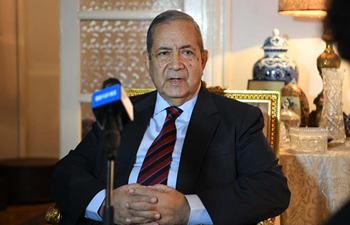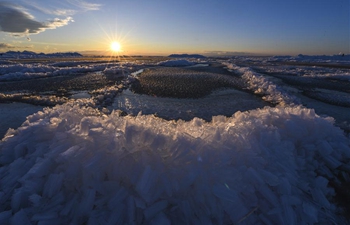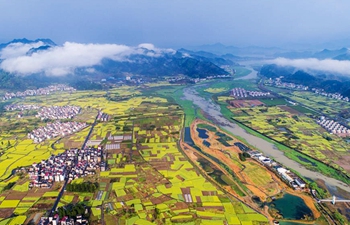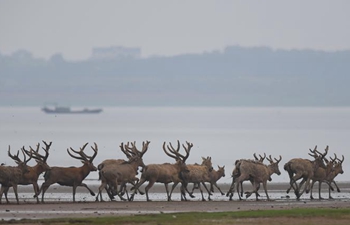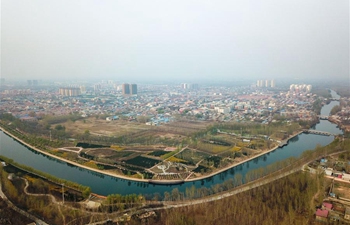
Demonstrators take part in a protest near the Mexico-U.S. border during U.S. President Donald Trump's inspection of the prototypes for the border wall, in Tijuana, Mexico, March 13, 2018. (Xinhua Photo)
WASHINGTON, April 4 (Xinhua) -- U.S. President Donald Trump will sign a proclamation on Wednesday directing the deployment of the National Guard to the country's border with Mexico, Homeland Security Secretary Kirstjen Nielsen said.
"The President has directed that the Department of Defense and the Department of Homeland Security work together with our governors to deploy the National Guard to our southwest border," Nielsen told a White House news briefing.
"The president will be signing a proclamation to that effect today," she said.
Troops could be sent to the border as early as Wednesday night, Nielsen said, adding that the National Guard would support U.S. Custom and Border Protection but would not be involved in enforcement.
Though Nielsen did not detail the number of those deployed, where they will go, how long they will stay, or the cost of the operation, she vowed that "it will be strong, it will be as many as needed to fill the gaps."
The secretary also noted that the administration would be asking Congress to provide the legal authority and resources to address "this crisis at our borders."
The announcement follows days of Trump's public fuming over the immigration policy and border security as a result of what he sees "weak" border laws.
The president, who has signaled intentions to use the military to guard the border until his long-promised wall is built, said early Wednesday that the administration will be "taking strong action today."
"Our Border Laws are very weak while those of Mexico & Canada are very strong. Congress must change these Obama era, and the other, laws NOW!" Trump said in tweet.
Besides, Trump has recently reiterating his hard-line stances on immigration, while repeatedly calling out Mexico over the border security and stressing the need for a wall on the southern border.
The 1.3-trillion-U.S.-dollar spending bill, signed into law by Trump last month, only grants 1.6 billion dollars for border security measures, far short of what the administration has sought.
Trump has proposed using military funding to build the border wall but it's likely to face both political and legal challenges before the idea can be put into action.
The White House said the president has received briefings on what it called "the growing influx of illegal immigration, drugs and violent gang members from Central America" and directed an administrative strategy to confront it and protect America's national security.
Analysts say those measures, workable or not, signal a shift towards a much tougher enforcement on immigration by the Trump administration, as part of efforts to maintain the president's political base.
Dan Mahaffee, senior vice president and director of policy at the Center for the Study of the Presidency and Congress, told Xinhua that Trump "feels more embattled by outside pressure, yet emboldened by taking the reins of his White House."
"He is pursuing policies that he thinks will fire his base," Mahaffee said of Trump's moves.
Arizona Governor Doug Ducey tweeted that his state welcomes "the deployment of National Guard to the border." "Washington has ignored this issue for too long and help is need," he said. "For Arizona, it's all about public safety."
Though sending National Guard to the border is not unprecedented, similar moves by Trump's predecessors were criticized for their high cost and limited effectiveness.
In 2006-2008, former President George W. Bush sent 6,000 guardsmen to Southern border states, with a cost of 1.2 billion dollars. The troops only assisted with less than 11.7 percent of total apprehensions at the border and 9.4 percent of marijuana seized during that time.
For the Obama administration, a total of 1,200 guardsmen were deployed to the border, costing 110 million dollars and assisting with 5.9 percent of the total apprehensions and 2.6 percent of the marijuana seizures on the border.
According to federal laws, the military are prohibited from being used for law enforcement. Troops could serve support roles like training, construction, and intelligence gathering.




